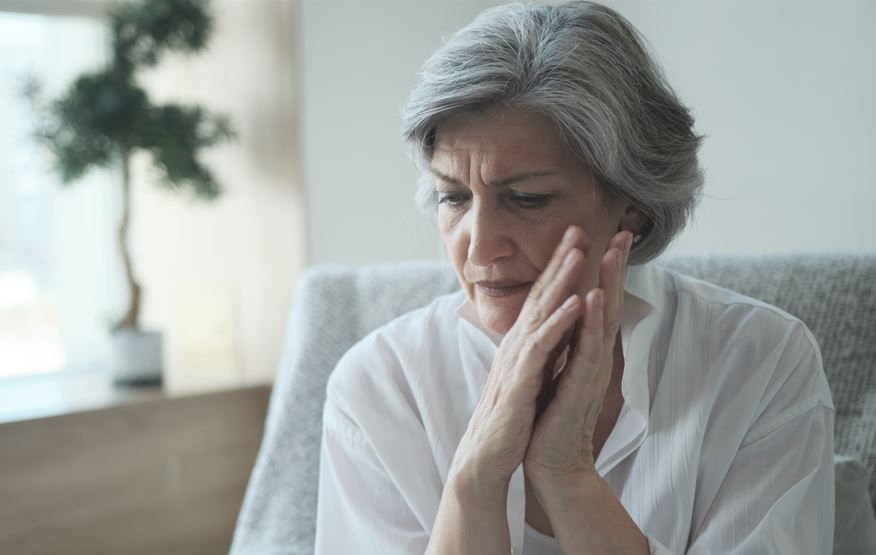- Clinical Technology
- Adult Immunization
- Hepatology
- Pediatric Immunization
- Screening
- Psychiatry
- Allergy
- Women's Health
- Cardiology
- Pediatrics
- Dermatology
- Endocrinology
- Pain Management
- Gastroenterology
- Infectious Disease
- Obesity Medicine
- Rheumatology
- Nephrology
- Neurology
- Pulmonology
Anxiety Linked to Increased Risk for Acute Exacerbations in Older Adults with COPD
Nearly 20% of an older cohort with COPD reported anxiety that was subsequently associated with more severe symptoms and acute exacerbations.
Among older adults with chronic obstructive pulmonary disease (COPD), nearly 1 in 5 (19.8%) reported symptoms of anxiety, according to a new study. Compared with contemporaries with COPD who did not have anxiety, this group experienced more severe COPD symptoms and more frequent acute exacerbations of COPD (AECOPD).
©justlight/stock.adobe.com

The findings, published in Frontiers in Medicine by researchers from the Department of Pulmonary and Critical Care Medicine, Huadong Hospital, Fudan University, in Shanghai, China, underscore the importance of routine psychiatric screening in management of COPD in older adults and of early intervention to treat symptoms of anxiety and to reduce the risk of symptom onset, study authors wrote.
Anxiety is a common comorbidity in adults with COPD, according to the researchers who cited data from past studies that found a range in prevalence from 10% to 55% for inpatients and 13% to 46% for outpatients. Poor mental health in general often affects older individuals with COPD with anxiety being a leading component, they added. Anxiety often becomes more severe with aging, as dyspnea increases and physical function grows more limited along with reduced social interaction, authors continued. The paucity of research conducted with this older population led the team to explore the risk factors for anxiety in older adults with COPD and the effects of the disorder on future AECOPD.
The cohort of 424 participants with COPD was recruited from pulmonary outpatient clinics at Shanghai hospitals between June 2017 to December 2020. Median age of the group was 70 years and the majority were men (89.60%).
Based on scores on the Hamilton Anxiety Rating Scale (HAMA) researchers divided the group into those with anxiety (n = 84) and those without anxiety (n = 340) (HAMA of 14 or greater was defined as COPD with anxiety). At the first visit, they collected data based on a physical examination and recorded AECOPD frequency and severity in the previous year; follow-up was for 1 year.
FINDINGS
One or more comorbidities affected 86.79% of the participants and more than half (56.13%) reported at least one AECOPD in the previous year.
Compared to the group without anxiety, number of pack years, AECOPD, and comorbidities was greater among those with the disorder. Participants with COPD and anxiety also had higher scores on the mMRC and CAT, and 6MWD was shorter.
When the researchers evaluated risk factors for anxiety, greater COPD severity, based on the BODE index score, was associated with a higher risk, with an odds ratio after multivariable adjustment of 2.45 (1.83–3.408; P <.05). Risk of anxiety also was greater based on higher mMRC score (aOR 2.46, 1.86–3.26; P <.05) and was significantly elevated based on higher score on the CAT (aOR 3.55, 2.13–5.91; P <.05). The authors found no significant association with 6MWD and risk of anxiety.
The team reported that older adults with COPD and more than 1 comorbidity (aOR 5.67, 95% CI, 3.19-10.07; P <.001) and those who experienced AECOPD in the previous year (aOR 4.00, 95% CI, 2.20-2.27; P <.001), were at a greater risk of developing anxiety. Further they found that having anxiety significantly increased the risk of AECOPD within 1 year, with unadjusted odds of 4.25 (95% CI, 2.37-7.63). The risk of increase was elevated for both moderate AECOPD (OR 2.65; 95% CI, 1.53-4.61) and severe AECOPD (OR 2.01, 95% CI, 1.22-3.30).
The researchers pointed to 2 specific limitations with the study, the first being use of AECOPD data from participants’ hospital medical records which risks underreporting of frequency if care was pursued in other locations as well. Also, anxiety assessed using tools other than the HAMA may produce different results.
“In COPD management, routine screening for psychiatric symptoms should be an integral part of clinical work to reduce the risk of anxiety in older COPD patients at an early stage,” the authors concluded.
